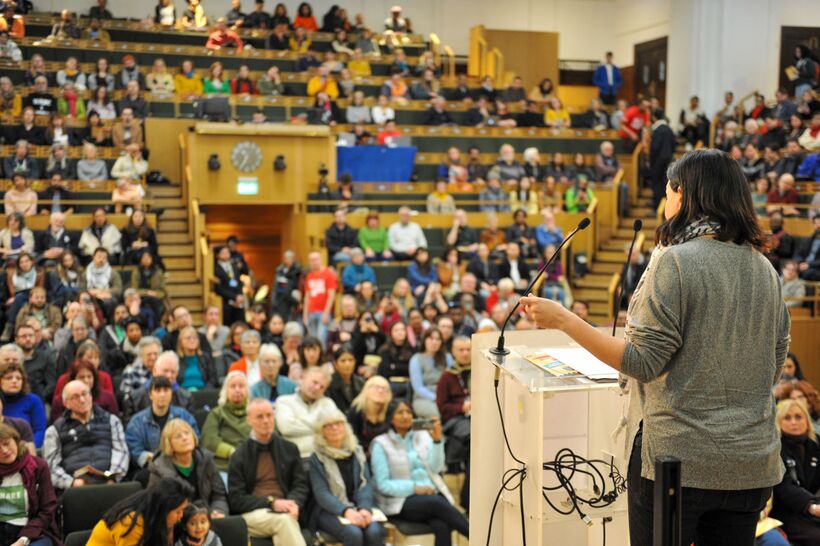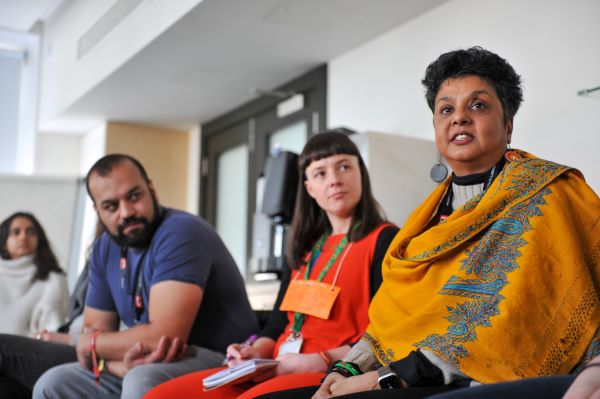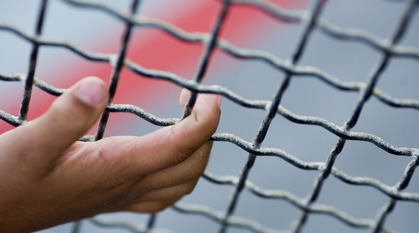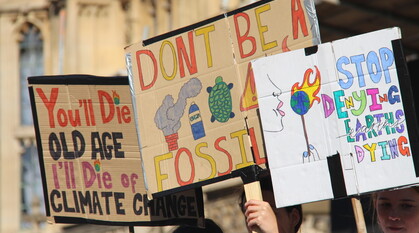And Still We Rise: building collective action in the face of multiple crises
On Saturday 24 February 2024, Friends House in London opened its doors for War on Want's 'And Still We Rise' climate justice festival. Rebecca WalkerWoo shares some reflections on the day.

'And Still We Rise' brought together almost 1000 people and 100 speakers from 25 different countries around the world. It was the latest event in a long tradition of hosting movements for social justice at Friends House. A tradition of movement generosity (i.e. thinking about how those with space and resources can share what they have with movements to build a peaceful and sustainable world) which Quakers in Britain is committed to practising.
With over 20 sessions across the day, ranging from Workers of the World uniting to Singing for Solidarity and Justice, you could feel the buzz of excitement around the building. To some, perhaps it was just another conference. But to others, it offered something special after months of a particularly bleak winter – politically, financially, emotionally.
People gathered across generations and industries and from communities around the world. In the corridors, courtyard and rooms, I witnessed connections form and ideas spark, as well as lots of opportunities for people, groups and organisations to share their work and garner support.
The power of coming together
War on Want organised the 'And Still We Rise' festival to forge global solidarity, inspire collective action, and build solutions to turn crisis into justice. You could see that in the richness of the panels and the care that went into trying to provide live interpretation. You could see it too in the themes of breaking down dominant global structures – economic, military, political – and in the imagining and creating of just solutions together.
With such grand ambitions, unsurprisingly the programme was a moving feast and technical problems presented themselves. But people adapted, fixes were found and we gathered. Together in one place, in one moment in time.
Grounding our actions
For Quakers in Britain, our hope for the day was not just to share a space for people to come together, but also to offer a chance for people to tend to their hearts as well as their minds. In a corner of Friends House, through the skilled hands of our Faith in Action Coordinator, Lyndsay Burtonshaw, we led a session on spiritual activism with Rehena Harilall and Mizanur Rahman. We listened to how justice shows up in Rehena and Mizan's faiths and beliefs and what gives them strength in the face of the crises we face. And we spent some time reflecting and grounding ourselves in what fires our own activism.
"I find strength in knowing that I'm part of the process towards change. I come from a tradition of people – in my mind – that were part of the process themselves as well. They were changemakers. And knowing that the oppression that they faced but with that oppression they still kept on going gives me a lot of strength."
(Mizan Rahman, a spoken word artist, activist & campaigner active within the Muslim community, speaking at the 'And Still We Rise' festival)
"In Zulu culture when we die we actually say we do not die, we use the term, we kneel…And we kneel because when we kneel it gives the opportunity for someone else to stand on our shoulders. It makes it easier for them to stand on our shoulders. So we also always stand on the shoulders of others."
(Rehena Harilall, a South African activist and psychologist who founded Buddhists Across Traditions, speaking at the 'And Still We Rise' festival)
Strengthening a movement
If we want to respond to the crises of climate breakdown and inequality in a profound and transformative way, we need strong and diverse movements coming together like they did at 'And Still We Rise'. We heard from the degrowth economists, debt justice and racial justice activists, indigenous movements such as the Women for Buen Vivir (good living), grassroots groups such as Migrants Organise and Sisters Uncut, poets, human rights lawyers, artists and writers, among many others. Powerful movements are made up of many roles and intersecting struggles.
For Quakers in Britain, we seek to occupy a few roles. We try to be movement generous and to offer spiritual grounding. We also campaign to divert finance away from fossil fuels and into repairing the harms caused by climate breakdown. If that sounds like your cup of tea, we'd love you to join us!
Our vision is to build Heaven on Earth by moving away from extraction (the exploiting of our earth's resources and people's labour) and moving towards regeneration (where we allow the earth's resources to regenerate and prioritise ecological and social well-being). We do this in two key ways:
– By campaigning against insurance for new fossil fuel projects
We put pressure on the companies supporting fossil fuel polluters and say – if we want to ensure a safe and livable future, we need to stop building new fossil fuel projects like oil fields and coal mines. Under the umbrella of the Insure our Future campaign, we work alongside families, faith representatives and climate justice activists to invite the insurance industry to use its significant influence in the global economy to put the world on a safer trajectory. Our ask is simple: stop insuring new fossil fuel projects; support renewable energy projects instead.
– By campaigning to make polluters pay
We shine a light on fossil fuel polluters and say – if you pollute our collective climate, you pay for it. Alongside climate justice campaigners around the world, our Make Polluters Pay campaign has worked to turn climate-induced loss and damage into an issue everyone is talking about. We've made real progress: last year saw the establishment of an international Loss & Damage fund backed by 198 countries. But now we need to make sure it's the polluting companies that pay the cost.



